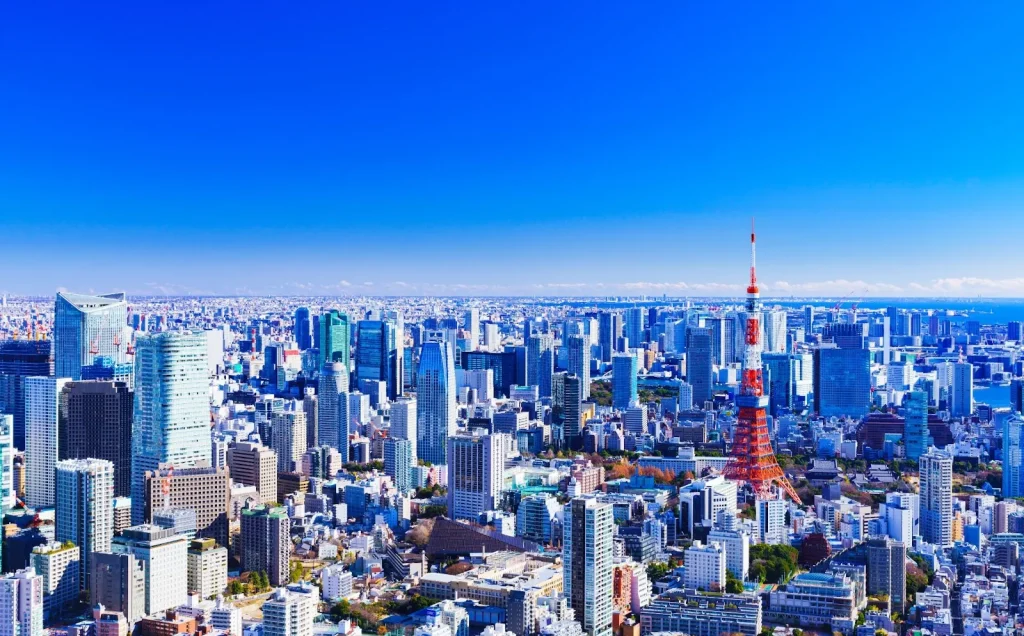【 Latest 】 What is the average annual salary of Japanese working in Tokyo? Average wage of foreigners is also explained.

Foreigners who decide to live alone in Tokyo may be curious about how much money Japanese people working in Tokyo earn. Tokyo is one of the most expensive areas in Japan, and the cost of living is high, so it is natural to want to know a rough estimate of how much income one can expect to earn to live in Tokyo with peace of mind.
In this article, we will therefore provide detailed information on the average annual salary of Japanese nationals working in Tokyo by gender, age, education, distinction, and industry. We will also explain the average wage in Tokyo for foreigners and the most popular occupations for foreigners in Tokyo, so please take a look.
▼Goandup Picks Click here for recommended articles!
- Required before studying abroad! Goandup Nihongo+, an online Japanese language learning service
- This page introduces services for foreigners who wish to study in Japan or improve their Japanese language skills to learn Japanese online.
- Goandup Salon" community for foreigners living in Japan
- We introduce an online community where foreigners living in Japan can exchange information and interact with each other to support their life in Japan.
- Goandup Study" supports foreigners who want to study in Japan.
- This section introduces study abroad support services that provide comprehensive support to foreigners who wish to study in Japan, from preparation for study abroad to living in Japan.
- Where can I buy a prepaid SIM in Japan? Recommended SIM cards for foreigners are also introduced.
- How to purchase a prepaid SIM and suitable SIM cards for foreigners.
- The Complete Guide to Pocket Wi-Fi in Japan for Foreigners!
- We introduce how to select and recommend pocket Wi-Fi products that can be used conveniently in Japan.
- The Complete Guide to Finding a Job in Japan! Finding a job, changing jobs, and part-time work for foreigners
- This site provides foreigners who want to work in Japan with comprehensive information on how to find a job, recommended job sites, and other information necessary to find a job.
What is the average income of Japanese working in Tokyo?

The average annual salary of Japanese workers in Tokyo is considerably higher than the national average. According to the 2023 Basic Survey on Wage Structure by the Ministry of Health, Labor and Welfare, the average annual income of workers in Tokyo in 2023 was 3,685,000 yen, much higher than the national average of 3,183,000 yen and about 1.16 times the national average.
Tokyo's high average annual income is due to the fact that it is the political and economic center of Japan and the region where the headquarters of many large companies are located. This is because there are so many employment opportunities and companies that can offer high wages are concentrated in the area.
Another aspect is that the cost of living level is outstandingly high in Japan, and therefore the wage level is commensurate with the cost of living. The reality is that it costs more to live in Tokyo than in regional cities.
Keep in mind, however, that this is only an average, so some people's annual income may actually be much lower than this, while others may have an annual income of 1 TP92T higher. An individual's annual income is highly dependent on a variety of factors, including job type, company size, and length of employment.
Reference:2023 Basic Survey on Wage Structure|Ministry of Health, Labour and Welfare
The issue of minimum wage is a concern for those working in Tokyo. Tokyo's minimum wage is one of the highest in Japan, but how has it changed over time? For details, see "【 Latest 】 What is the minimum wage in Tokyo? Explanation of changes to date and comparison by prefecture.The explanation is provided in the following section.
Average annual income and wages by genre for Japanese working in Tokyo

Let's look at the average annual salary of Japanese working in Tokyo, broken down by gender, age, education, by 23 different categories, and by industry. All data are for the year 2023.
1. by gender
The average annual income for men and women in Tokyo is 4,096,000 yen for men and 2,992,000 yen for women. Men's annual income level is more than 1,000,000 yen higher than women's, indicating a considerable gap between the two.
In Japan, men generally tend to be paid higher wages than women, even for the same job title and position, and this is also true in Tokyo. Efforts have been made in recent years to correct the wage gap between men and women, but it appears that there are still issues to be addressed.
The reasons for this disparity include the fact that men have historically been regarded as the primary breadwinners in households, and that women on average have been in the workforce for less time than men. The fact that many women take time off from work or quit after childbirth or child rearing also seems to be a contributing factor to the wage gap.
However, this situation is gradually improving. As the number of dual-earner households increases and women continue to advance in society, more and more workplaces are evaluating individuals based on their abilities and performance, regardless of gender.
However, there is still a large wage gap between men and women. If you want to increase your annual income, it is important to continue working as a full-time employee without making blanks as much as possible, even if you are a woman.
| gender | average annual income |
|---|---|
| masculine gender | 4,096,000 yen |
| female | 2,992,000 yen |
2. by age
Average annual income by age in Tokyo increases with age for both men and women, peaking in the late 50s but declining after age 60.
The difference in annual income between men and women is small until their early 20s, but by their 30s, there is already a gap of more than 500,000 yen. Thereafter, the gap gradually widens, and from the 40s to the 50s, the difference in annual income is more than 1 million yen. During this period, women's annual income growth is not as large as that of men.
Women often take time off or quit their jobs due to marriage or childbirth, and even when they return to work, they tend to work part-time to raise their children, so their annual income tends to be stagnant.
| by age | masculine gender | female |
| ~19 years old | 1,840,000 yen | 1,963,000 yen |
| 20-24 years old | 2,535,000 yen | 2,321,000 yen |
| 25-29 years old | 2,969,000 yen | 2,638,000 yen |
| 30-34 years old | 3,418,000 yen | 2,915,000 yen |
| 35-39 years old | 3,896,000 yen | 3,223,000 yen |
| 40-44 years old | 4,313,000 yen | 3,281,000 yen |
| 45-49 years old | 4,638,000 yen | 3,392,000 yen |
| 50-54 years old | 485.3 million yen | 3,479,000 yen |
| 55-59 years old | 530,000,000 yen | 3,317,000 yen |
| 60-64 years old | 4,113,000 yen | 2,880,000 yen |
| 65-69 years old | 3,811,000 yen | 2,026,000 yen |
| 70 years old and up | 2,824,000 yen | 2,238,000 yen |
3. by educational background
Looking at starting salaries in Tokyo by educational background, university graduates have the highest starting salary at 212,500 yen. This is followed by junior college and special training college graduates at the same amount of 200,000 yen, and high school graduates at 183,300 yen.
Although there is not much difference between educational backgrounds, it is still apparent that starting salaries for college graduates tend to be the most favorable. Graduating from a university is often an advantage in job hunting.
Compared to the previous year, starting salaries for college and high school graduates increased by 1.2% and 1.8%, respectively, while those for junior college and special training college graduates remained unchanged. Starting salaries for college and high school graduates appear to be rising gradually but steadily.
However, this is only a starting salary, and actual annual income will vary greatly depending on years of service and career plans. A high level of education will not necessarily translate into a higher annual salary.
| academic background | Starting salary (thousand yen) | Year on year (%) |
|---|---|---|
| post-secondary education institution, incl. university, college, etc. | 2,125,000 yen | 1.2 |
| junior college | 200,000,000 yen | 0.0 |
| specialization | 200,000,000 yen | 0.0 |
| high school | 1,833,000 yen | 1.8 |
4. 23 distinctions
Within the 23 wards of Tokyo, there is a wide range in average annual income among the wards. Minato Ward has the highest average annual income at 11.85 million yen, followed by Chiyoda Ward at 9.85 million yen and Shibuya Ward at 9.12 million yen. All of these wards are located in central Tokyo and are known for their concentration of large corporate headquarters and upscale residential areas.
On the other hand, Adachi and Katsushika wards have the lowest average annual incomes, both at only 3.57 million yen. At the bottom of the list are wards located in the eastern and northern parts of Tokyo, such as Edogawa Ward at 3.78 million yen and Itabashi Ward at 3.77 million yen.
Comparing the top three wards with the bottom three wards, the difference is actually more than three times as large. The average annual income in Minato Ward is 3.3 times that of Adachi and Katsushika Wards.
It should be noted, however, that this is the average annual income of those who live in the ward and not of those who work there. Wards in central Tokyo are popular among high-income earners due to their convenience, and are supported by such demand. However, not everyone can earn a high income by working there.
| order | district | Average annual income (ten thousand yen) |
|---|---|---|
| 1 | Harbour Ward (e.g. in Tokyo) | 11.85 million yen |
| 2 | Chiyoda Ward | 9.85 million yen |
| 3 | Shibuya Ward | 9,120,000 yen |
| 4 | Chuo Ward (esp. Tokyo) | 7.12 million yen |
| 5 | Meguro Ward | 6.39 million yen |
| 6 | Bunkyo Ward | 6.24 million yen |
| 7 | Setagaya Ward | 5.72 million yen |
| 8 | Shinjuku Ward | 5.61 million yen |
| 9 | Shinagawa Ward | 5.17 million yen |
| 10 | Suginami Ward | 4.78 million yen |
| 11 | Toshima Ward | 4.66 million yen |
| 12 | Koto Ward | 4.62 million yen |
| 13 | Taito Ward | 4.46 million yen |
| 14 | Ota Ward | 4,450,000 yen |
| 15 | Nakano Ward | 4.32 million yen |
| 16 | Nerima Ward | 4.3 million yen |
| 17 | Sumida Ward | 4.05 million yen |
| 18 | northern district | 3.9 million yen |
| 19 | Arakawa Ward | 3.88 million yen |
| 20 | Edogawa Ward | 3.78 million yen |
| 21 | Itabashi Ward | 3.77 million yen |
| 22 | Adachi-ku | 3.57 million yen |
| 23 | Katsushika Ward | 3.57 million yen |
5. by industry
Looking at wages in major industries in Tokyo, the electricity, gas, heat supply, and water supply industry has the highest wage at 410,000 yen, followed by the academic research, professional and technical services industry at 397,000 yen and the financial and insurance industry at 393,000 yen. Many jobs in these industries require specialized knowledge and skills, which is thought to be the reason for the high wages.
On the other hand, wages are lowest in the accommodation and food services industry at 259,000 yen, followed by 279,000 yen in the lifestyle-related services and entertainment industry and 286,000 yen in the services industry (not elsewhere classified). These industries tend to have a high percentage of non-regular employees and low wage levels.
The highest percentage change from the previous year was in services (not elsewhere classified) at 6.4%, followed by mining, quarrying, and gravel extraction at 5.6% and finance and insurance at 5.2%. The education and learning support industry is slightly down at -0.1%.
Wage differences by industry are influenced by the skills and knowledge required, the supply-demand relationship in the labor market, and company performance. Wages are higher in sectors where there is a shortage of highly specialized personnel, while wages are lower in sectors with low barriers to entry and a large supply of personnel.
However, it is important to consider that even within an industry there are differences between companies.
| industry | Wages (Thousands of yen) | Percentage change from the previous year (%) |
|---|---|---|
| Mining, quarrying, gravel extraction | 367,000 yen | 5.6 |
| construction industry | 349,000 yen | 4.2 |
| manufacturing industry | 306,000 yen | 1.5 |
| Electricity, gas, heat supply, and water supply | 410,000 yen | 2.0 |
| telecommunications industry | 381,000 yen | 0.6 |
| Transportation and postal services | 294,000 yen | 3.1 |
| Wholesale and retail | 320,000 yen | 1.6 |
| Finance and insurance | 393,000 yen | 5.2 |
| Real estate and goods leasing | 341,000 yen | 0.4 |
| Academic research, professional and technical services | 397,000 yen | 2.9 |
| Lodging and food services | 259,000 yen | 0.8 |
| Lifestyle-related services and entertainment | 279,000 yen | 2.6 |
| Education and learning support industry | 377,000 yen | -0.1 |
| Medical care, welfare | 298,000 yen | 0.4 |
| Complex Service Business | 302,000 yen | 1.1 |
| Services (not elsewhere classified) | 286,000 yen | 6.4 |
Average wage of foreigners working in Tokyo

Although detailed data on the average wage of foreign workers in Tokyo is not available, the Ministry of Health, Labour and Welfare's "2023 Basic Survey on Wage Structure" shows that the average wage of foreign workers nationwide was 233,000 yen, down 6.4% from the previous year.
By status of residence, the average wage in the professional/technical field (excluding specified skills) was the highest at 297,000 yen, followed by status-based activities at 265,000 yen and others (activities other than specified activities and studying abroad) at 231,000 yen. On the other hand, the lowest wage is 182,000 yen for technical training, followed by 198,000 yen for specified skills.
Wages for foreign workers vary widely depending on their status of residence. Personnel with specialized skills earn higher wages, while those engaged in simple labor, such as technical interns, tend to earn lower wages.
Incidentally, given that the wage level in Tokyo is 1.16 times the national average, the average annual income of foreign workers in Tokyo is estimated to be about ¥233,000 per month (the average wage of foreign workers in Japan) x 1.16 ≈ ¥270,000, which when converted into annual income, is ¥270,000 x 12 months = ¥3.24 million. However, this is only an estimate, and the reality is that there are large differences in wage levels depending on the status of residence and type of industry.
| Status of Residence | wages |
|---|---|
| Total Foreign Workers | 233,000 yen |
| Professional and technical fields (excluding specific skills) | 297,000 yen |
| specific skill | 198,000 yen |
| based on a person's identity | 265,000 yen |
| technical internship | 182,000 yen |
| Other (activities other than specified activities and study abroad) | 231,000 yen |
While the cost of living is high in Tokyo, high income can also be expected. However, rent and living expenses are also high. How much are these living expenses when living alone?
For more information on the rent situation in Tokyo, see "List of areas in Tokyo with inexpensive rent and rent pricesYou can find a detailed explanation in the "Living alone in Tokyo" section. Also, if you would like to know more about the cost of living alone in Tokyo, please refer to "How much does it cost to live alone in Tokyo? Detailed explanation of rent, utilities, etc.Please refer to the "How to.
If you are interested in rent prices in areas outside of Tokyo, please contact "Which prefectures have the cheapest rent in Japan? Compare rent prices by regionwill also provide useful information.
Occupations where many foreigners work in Tokyo

Finally, here are three occupations that are popular among foreigners in Tokyo.
Programmer/Engineer
Programmers and engineers are among the most popular jobs among foreigners in Tokyo, where many IT companies are located. In many cases, you can work in the system development field with a certain level of English proficiency, even if you do not speak Japanese very well.
Also, programmer/engineer jobs offer relatively high annual salaries. If you hone your skills, you will be able to work with treatment comparable to that of Japanese nationals.
On the other hand, they tend to work overtime and on holidays in order to meet deadlines. It can be said that it is difficult to maintain a work-life balance in this type of work.
The IT industry is an attractive place to work for foreigners, but what kind of work is available, what skills are needed, and how much annual income can be expected? "How do foreigners work in the IT industry in Japan? Explanation of types of work, required skills, annual income, etc.The details are explained in the following section.
Language school teacher
There are many language schools in Tokyo, and foreign teachers are in high demand. English conversation school teachers are particularly common, but there are also teachers of Chinese, Korean, Spanish, and many other languages.
The major advantage of this job is that it can be done even if one's Japanese is not perfect, since it is a job that makes use of one's native language. In addition, a bachelor's degree is generally required to work as a school teacher, a requirement that can be met if you have graduated from a university in your home country.
Nevertheless, a certain degree of Japanese language ability is required for everything from resume writing to interviews and actual classes. Since there are many miscellaneous tasks outside of the classroom, there will be situations where it will be difficult to use English alone.
English language teaching is a particularly popular profession among foreigners, but what qualifications and requirements are actually needed? "An easy-to-understand explanation of the basics of how a foreigner can become an English teacher in Japan!details the steps to becoming an English teacher.
Restaurant and service industry
Tokyo has a very large number of restaurants, ranging from fast food restaurants to family restaurants, izakaya (Japanese style pubs), and fine dining establishments. With the increase in the number of foreign tourists, more and more restaurants are actively hiring foreign staff.
Since we are in the customer service industry, learning Japanese is essential, but if the store is located in a tourist area, etc., simple Japanese and gestures are often sufficient.
Also, if you work in a restaurant that serves food from your home country, the Japanese language barrier is much lower. For example, in Indian restaurants, there are often cases where Indian staff members work while speaking in their native language, so even if you are not comfortable with your Japanese, it is 大丈夫.
Serious employment support to help you realize your dream of working in Japan!

Do you want to work in Japan?
Let us "Goandup" make that dream a reality!
【 Program Features 】
✅ JLPT N3 level Japanese language acquisition
✅ Thorough preparation for the specific skills test
✅ Full support for job hunting in Japan
Business-focused one-on-one lessons will help you find a job in Japan in the shortest possible time.
【 Program Menu 】
- Individual Japanese language lessons
- Intensive curriculum to obtain N3, especially specialized lessons for business Japanese that can be used at work.
- Intensive curriculum to obtain N3, especially specialized lessons for business Japanese that can be used at work.
- Preparation for the Specific Skills Test
- Customized materials for specific skill tests will be used to focus on frequently asked questions and learning to pass the test.
- Customized materials for specific skill tests will be used to focus on frequently asked questions and learning to pass the test.
- Resume and CV support
- To create resumes and CVs tailored to Japanese corporate culture, and to brush up on self-promotion and motivation for application.
- To create resumes and CVs tailored to Japanese corporate culture, and to brush up on self-promotion and motivation for application.
- Interview Preparation
- Guidance on areas for improvement through mock interviews and feedback based on corporate interview scenarios. Learn interview etiquette and behavior unique to Japan.
- Guidance on areas for improvement through mock interviews and feedback based on corporate interview scenarios. Learn interview etiquette and behavior unique to Japan.
- career consulting
- Provide introductions to companies that match the participant's career goals, select companies to apply to, and provide advice on the level of knowledge required by the companies to which the participant is applying.
- Provide introductions to companies that match the participant's career goals, select companies to apply to, and provide advice on the level of knowledge required by the companies to which the participant is applying.
- Chat Support
- In addition to one-on-one individual lessons, we also accept casual questions via DM (visa application, living support, assistance in finding a room, etc.).
If you are serious about your career in Japan, join us now!
▶︎ for more informationclick here.
We will do our best to support your success in Japan!
summary
Tokyo is the city with the highest average annual income in Japan, at about 1.16 times the national average. Men have higher average annual incomes than women, and the income gap tends to widen as age increases.
Even within the 23 wards of Tokyo, there are large regional differences in average annual incomes. By industry, IT-related and physical labor jobs have relatively high incomes, while welfare and customer service jobs have lower incomes. The average annual income of foreign workers in Tokyo is estimated to be around 3.24 million yen, but the reality is that there are large differences in wage levels depending on the status of residence and type of industry.
Although the cost of living in Tokyo is high and the cost of living is high, the job options are wide and there are many opportunities to earn a high income. We hope you will find a career that suits you best and realize a better life in Tokyo.
The first step in finding a job in Tokyo is to check the job market. For foreign residents, there are many barriers to job hunting, such as language barriers and cultural differences.
."How do foreigners find a job in Japan? Information on job sites and preparation for interviews are also explained." details tips on how to find a job, and also provides a【 Preserved 】 Complete Guide to Finding a Job in Japan for Foreigners! Job Hunting, Changing Jobs, Part-Time WorkIn "How to Find a Job in Japan," we have compiled a comprehensive list of know-how for foreigners to find a job in Japan. We hope you will find it useful.
Your support will help us!
Thank you for visiting Goandup Picks. Our mission is to provide you with more useful information to show the world what Japan has to offer.
Your support will help us to further enhance our activities, so please support us!






